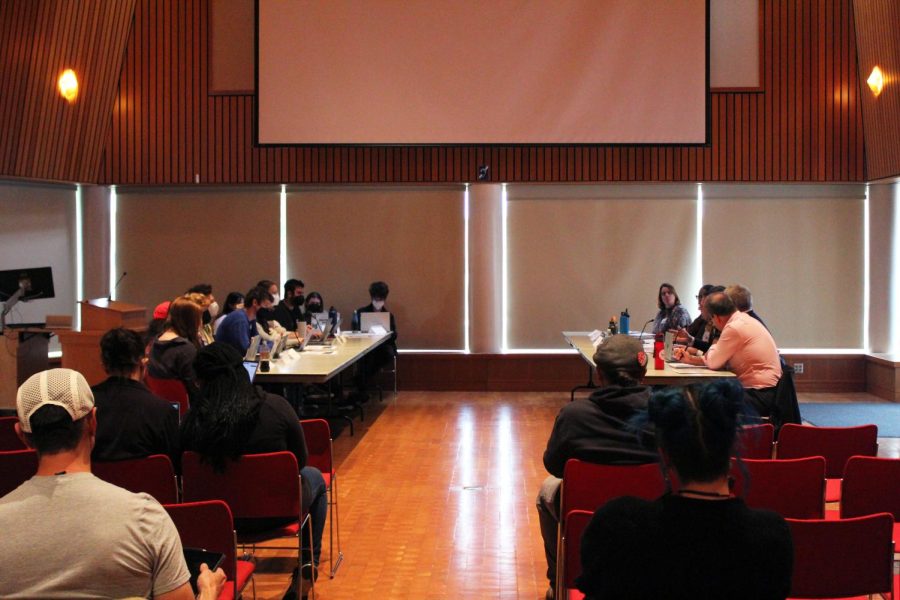College responds to UGSDW proposals with their own
Representatives from UGSDW and the College meet every Thursday at 4:30 p.m. to bargain a new contract that will affect all hourly student workers at Grinnell College.
October 31, 2022
In the first two collective bargaining sessions since expansion, the Union of Grinnell Student Dining Workers (UGSDW) bargaining team and the bargaining team from Grinnell College discussed UGSDW’s contract proposals, which concern conditions of Just Cause employment and the rights of UGSDW to communicate internally, distribute materials and access student data.
UGSDW presented a Just Cause proposal on Oct. 6, and the College’s bargaining team responded the following week with a proposal that, in contrast to the UGSDW proposal, excluded academic workers from receiving the same Just Cause protections.
In UGSDW’s proposals, Just Cause protections provide workers with a framework to establish if a termination was fair or not — the protections also provide recourse upon unfair terminations.
At the second bargaining meeting, the College’s team presented a response proposal that states that research assistants, teaching assistants, mentors and graders (student workers who are performing work duties related to a for-credit class at Grinnell) would be ineligible to receive the protections of Just Cause.
Frank Harty, who is acting as legal counsel to the College, said at the second bargaining session that this change is because the College believes establishing those Just Cause protections would disrupt the relationship between student workers and the faculty they are working for.
However, UGSDW’s team disputed that statement and said that there are no faculty members acting as direct supervisors for student workers because their actual supervisors are not the professors who they work under. They added that it was also against College policy to have professors act as direct supervisors to academic workers.
At Grinnell, faculty can be considered supervisors if they meet the National Labor Relations Act (NLRA) definition, according to Ellen de Graffenreid, vice president of communications and marketing.
“[A]s a supervisor, a faculty member could discipline or fire an academic worker who is under their supervision for a reason related to their job performance,” wrote de Graffenreid in an email to the S&B.
De Graffenreid specified that, like all other supervisors at the College, faculty supervisors cannot fire or discipline any student worker for any reason protected by federal or state law or in violation of the College’s employment policies.
A second UGSDW proposal requested information about when students are fired or given disciplinary action, which they say is to allow the union to be aware of the actions and able to contact students, informing them of their rights.
At the bargaining session on Oct. 13, the idea of Weingarten rights was introduced by both parties, who disagreed on whether or not the refusal to release data would violate these rights. Weingarten rights allow workers in a unionized workplace to have a union member present during disciplinary hearings or meetings that could lead to discipline.
The UGSDW bargaining team said they need the data in order to allow workers to exercise their Weingarten rights.
The UGSDW bargaining team said that they had received data about firings in the Dining Hall previously. According to Brad Lindberg, associate vice president of institutional initiatives and enrollment, the College stopped giving the data to the UGSDW due to recent changes in FERPA case law, which he said during the Oct. 13 bargaining season.
The College’s bargaining team, however, said that the release of information may compromise a student’s agency to choose to not have union involvement in disciplinary action.
“We responded in the way we did because we were concerned that peer pressure, we’re concerned that someone may not want one of their fellow students representing them, and that’s why it gives them the choice,” said Harty during the second bargaining meeting.
Lu Johnston `24 is a member of the UGSDW bargaining team. They said in an interview that the information release is important to allow the workers the option to exercise their Weingarten rights.
“But if we don’t know what’s happening, we can’t check in with that student worker and make sure that they are making an informed decision about whether or not to exercise these rights,” Johnston said.
Additionally, at the first session, UGSDW presented a neutrality and card check memorandum which would provide similar protections to the neutrality agreement for non-tenure track faculty and other full-time non-student workers in the event that they worked to form a union. This was not addressed by the College bargaining team, who said that conditions specific to staff and faculty have been addressed in their other responses.
Bargaining sessions have taken place every Thursday at 4:30 p.m. since their first session on Oct. 6 and will continue until a contract is negotiated.
As student workers, all staff members of the S&B will be included in future collective bargaining. The S&B remains an independent newspaper and is committed to maintaining its integrity in reporting.



















































